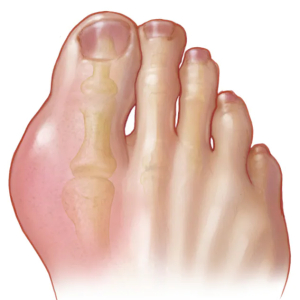According to The Arthritis Society of Canada, “Gout is the most common form of inflammatory arth-ritis.” It’s been around since time immemorial. And folks have traditionally blamed it on overindul-gence. But now, science says some of us are predestined to develop gout…
Diet, high blood pressure, obesity, medication, trauma, kidney disease, and dehydration can all contribute to gout attacks. But the latest science suggests it’s primarily a genetic disease.
What a pain!
Gout is a form of arthritis caused by the build up of urate crystals in your lower joints. Sounds sim-ple, but it’s it’s really quite complex, according to arthritis authorities. You’ think it would get more media coverage: it’s the commonest form of arthritis, afflicting 4 percent of men and 1 percent of women.
“It’s characterized by sudden, severe attacks of pain, swelling, redness and tenderness in one or more joints, most often in the big toe,” The Mayo Clinic says. As sufferers well know, “An attack of gout can occur suddenly, often waking you up in the middle of the night with the sensation that your big toe is on fire. The affected joint [may be] hot, swollen and so tender that even the weight of the bedsheet on it may seem intolerable.”
The good news…
… Is that most folks can prevent gout attacks by taking common medications that prevent the cryst-allization of urate in their blood.
The genetic angle
Researchers at the University of Otago (NZ) have thought there might be a better way to treat, or even prevent gout, focusing on the cause rather than the effects.
They reasoned that the disease is a chronic overreaction by the immune system to defend the body from urate crystals.If, indeed it it was genetic in origin, a treatment from the inflammation angle might be a better alternative.
What they found
After exhaustive analysis of data genetic information from 2.6 million people, accumulated by the world-wide private genetics company 23andMe, the team did conform the inherited roots of cout. And that opens door for a whole array of findings…
Takeaways
First, the team suggested that since gout, “is not the fault of the sufferer – the myth that [it] is caused by lifestyle or diet needs to be busted. […] This widespread myth causes shame in people with gout, making some […] more likely to suffer in silence and not go and see the doctor to get a preventive drug that lowers urate in the blood and will prevent their pain.”
The team stresses that, while the predisposition to develop gout is, indeed, inherited, sufferers need to rethink their approach to prevention. “People need to understand that, while specific dietary fact-ors, such as eating red meat, can trigger gout attacks,” they are not the cause. Nevertheless, aware-ness of and avoiding such foods can help reduce the chance of attacks.
Finally, researchers suggest one promising candidate for treatment of gout from the inflammation angle could be Tocilizuma. It’s already used to treat rheumatoid arthritis, targeting a receptor for an immune signaller, interleukin-6, which the new research identified as a main gene responsible for gout.
My take
And I swear by it. Folks on both sides of my family have suffered from gout – to a greater or lesser degree – going as back as many generations memory can plumb. And I’ve been taking the commonly-prescribed anti-crystallization drug Allopurinol for a few decades, now.
But for many years, I was one of those old-school fuddy-duddies who demurred from talking to my family doctor about gout because of the stigma factor.
If you’ve been ‘suffering in silence’, my heartfelt advice to you is, don’t wait another day to talk to your doctor. Even if you can’t take Allopurinaol, there are other drugs that may help. And soon there may be a revolutionary treatment addressing the fundamental, inflammation-based cause!
~ Maggie J.


